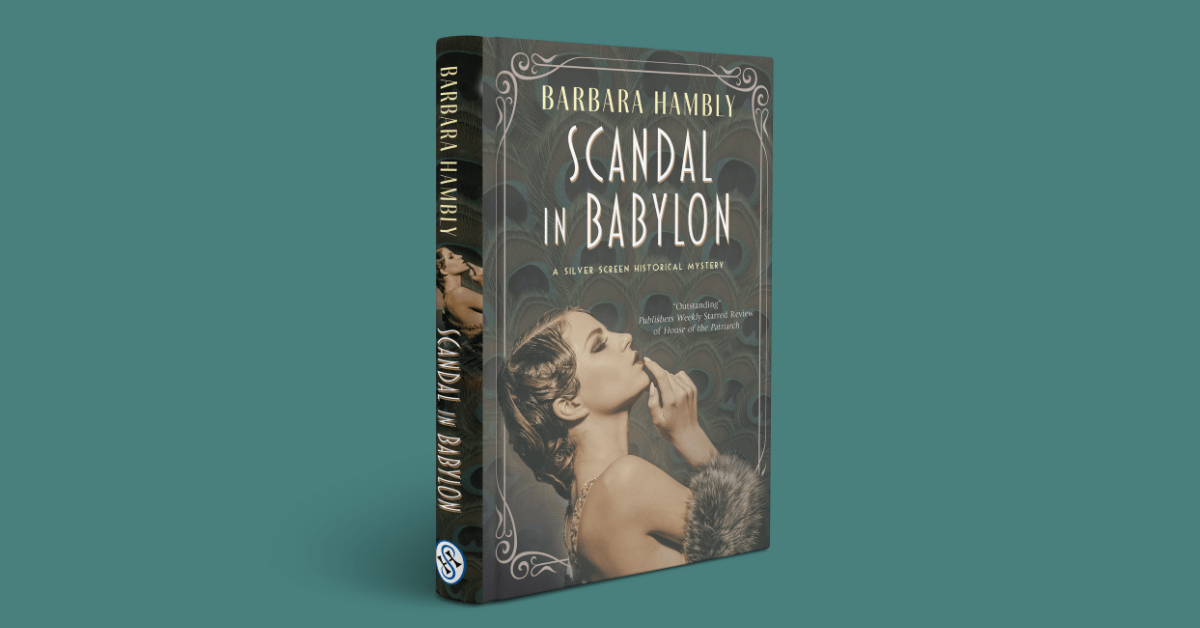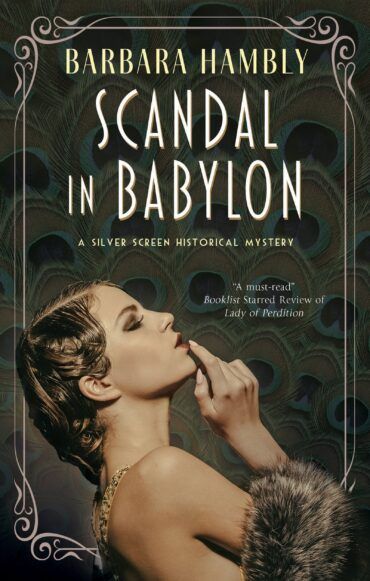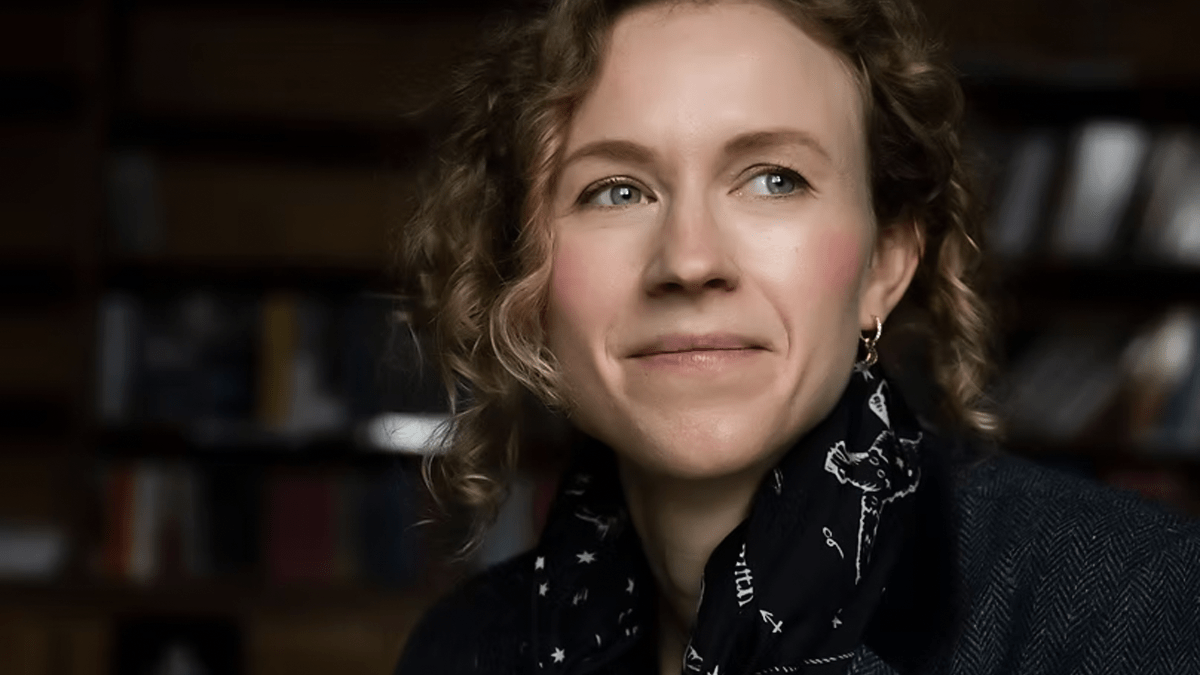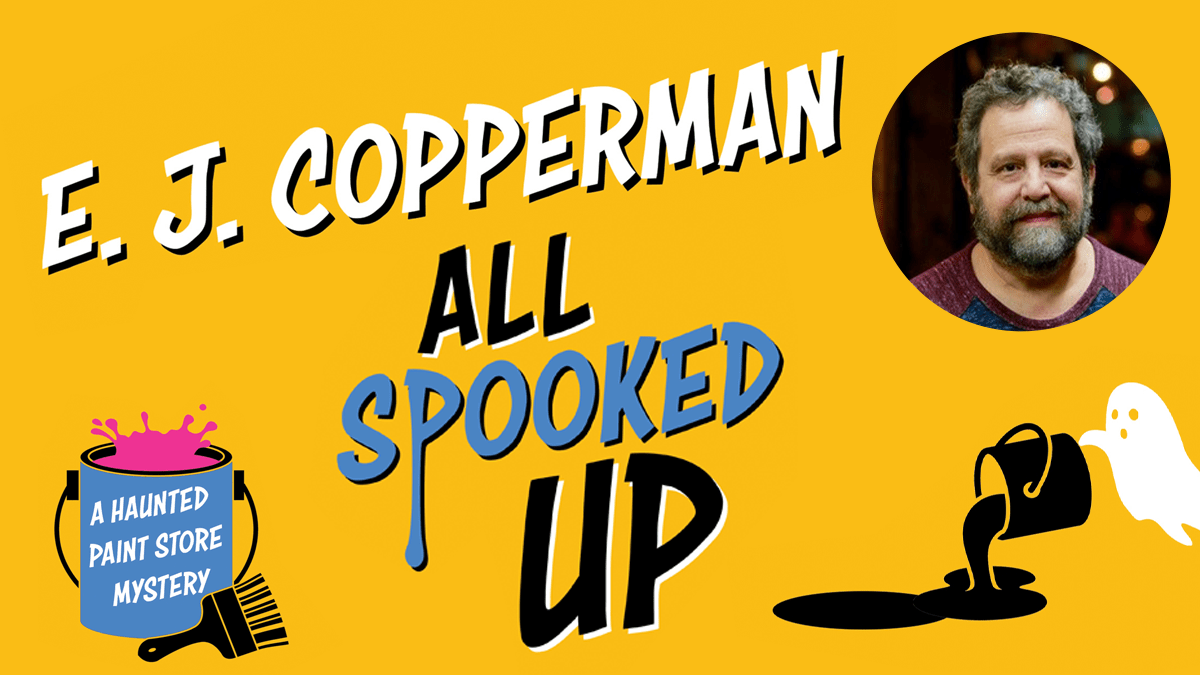Sneak Preview: Scandal in Babylon by Barbara Hambly
by Martin Brown on 28 July 2021

A sparkling series launch featuring Hollywood hijinks and a clever sleuth
Kirkus Reviews
“You shall never have a penny of my money. Leave me alone or I will shoot you dead!”
Scandal in Babylon is the first in a brand-new historical mystery series set in Hollywood’s glamorous, hedonistic silent movie industry from critically acclaimed author Barbara Hambly. Check out the atmospheric opening pages of the book below!
He swept her into powerful arms, pressed his lips to hers. The dark-haired woman gasped, struggled to turn her face aside, and the moonlight glimmered on the jewels that circled her throat, and gleamed on the half-unveiled marble of her breasts. Her small hands thrust at his mighty shoulders, clawed at the velvet of his cloak. But even as she struggled, her efforts melted into the grip of passion. The face she tried vainly to avert turned back, as if against her will, and her dark eyes closed with her surrender to passion and destiny . . .
‘CUT!’ Madge Burdon snatched off her plaid cap and hurled it to the studio floor. ‘Beautiful! Only, Kitty, if you could turn your head back and forth a little more. You’re really in love with this man, even though you hate him. And when Dirk grabs you tighter, really melt into his arms—’
‘If Dirk grabs my butt again,’ announced Kitty Flint – known to film fans from Jersey City to Yokohama as the incomparable Camille de la Rose – in her breathless little-girl coo, ‘he’s gonna get a knee in the balls and then we’ll really see somebody melt. Do you have any gin, darling?’ She turned those immense brown eyes, fringed with lashes like enameled black wire, toward her sister-in-law.
‘No gin.’ Emma Blackstone stepped over the stretched line of string that demarcated the camera area, lipstick and mirror in hand. After nearly six months in Hollywood she still felt rather like Alice stepping through the looking glass, tall and prosaic and a little gawky in her Oxford tweeds among the shadowy splendor of moonlight in Babylon . . .
Not that the moonlight was real. Nor, indeed, had Babylon been anything more than a heap of ruins when Roman centurions like Marcus Maximus (alias Dirk Silver) were attempting to seduce its empress in (supposedly) the first century AD . . .
But . . . διό και ϕιλοσοϕώτερον και σρου δαιότερον ποίησις ίστορίας έστίν, Aristotle had remarked – Emma could still hear Professor Etheridge at Somerville College intoning the ancient sage’s wisdom from on high. Poetry is something more philosophical and more worthy of serious attention than history.
Frank Pugh, studio chief and part-owner of Foremost Productions, would doubtless agree, though probably not in those words.
That was always supposing one could consider the scenario of Temptress of Babylon ‘poetry’.
‘Nertz.’ Kitty sighed, took the lipstick, and set about repairing the ravages that passion and destiny had wrought on her make-up. The kleig lights snapped off, and without their greenish-blue glare the Motion Picture Yellow of the rest of her face looked garish, without in the least, Emma reflected admiringly, impairing the beauty of those delicate features.
‘Just as well.’ The Empress of Babylon shrugged her perfect (and largely uncovered) shoulders. ‘I’ve simply got to find a new bootlegger before this weekend. I swear that last shipment of gin was straight out of his brother-in-law’s bathtub.’ She pursed her lovely mouth first into a pout, then into a kiss as she renewed its crimson gloss. A yard away, old Herr Volmort from Make-Up, looking more than ever like a bleached lizard in the rather grimy glow of the working lights, assisted Dirk Silver in the same task. Emma wondered what actual Babylonian empresses would have used to embellish their charms – the recipes for cosmetics she had encountered in Ovid and Juvenal didn’t sound like anything she’d want on her own face.
Well, she could use wine-lees, I suppose . . . But where would one get wine-lees in the United States these days, given the existence of Prohibition?
‘And I swear Dirk waxes his mustache with motor-oil.’ Kitty handed the lipstick back to her. ‘Thank you, sweetheart. Would you be a darling and see if you can find me something decent to drink in my dressing room?’
In six years of date-categorizing Roman statuary – both in her Oxford studies and as her archaeologist father’s assistant – Emma had never encountered anything resembling the debonair, pencil-thin adornment of the leading man’s upper lip. Or would Aristotle (or Professor Etheridge) consider that disregard of fact as another demonstration of the work’s Moral Purpose?
She stepped back over the string that divided the moonlit night in Babylon from the reality (if such it can be termed . . .) of Stage One at one thirty in the afternoon, and behind her Miss Burdon bellowed, ‘Lights!’ in a baritone that would have shaken the foundations of Olympus. ‘Camera! Action!’
Emma collected an astrology magazine from the nearest folding-chair (Daily Guide to Finding Your Man!), and watched as Kitty moved back toward Dirk. Arms extended, dark eyes – as the script instructed – ‘incandescent with hatred, dread, and passionate desire’ she bore a marked resemblance to a woman confronting a tarantula on the bathroom wall. For all her breathtaking beauty, Kitty was one of the worst actresses Emma had ever seen.
Dirk’s lips descended upon those of the beauty palpitating in his arms. But as he crushed her to his armored bosom she suddenly pushed him away in mid-palpitation . . . ‘Oh, Emma, darling, I almost forgot!’ (‘Cut!’ roared Miss Burdon.) Kitty fished in the abbreviated gauze recesses of her costume and produced an envelope. Emma would have bet her next week’s tea-money that the garment could not have concealed as much as a postage stamp.
‘This came for you, and Fishy’ – Conrad Fishbein was the head of Foremost Productions’ publicity department – ‘had it sent to my dressing room.’
Mrs Emma Blackstone, it said. C/o Foremost Productions, Hollywood, USA.
The sight of the handwriting was almost a physical shock. Emma turned her face quickly aside, trying to remember, as tears closed her throat, how long it had been since she’d actually cried.
Mother . . .
It wasn’t actually her mother’s hand. She knew that. Aunt Estelle’s writing was the same as Mother’s . . . Both had attended The Misses Gibbs’ Select Academy for Young Ladies back home, and had had that copperplate perfection sharply smacked into them with an oaken ruler. As had Emma, in her turn. She looked again and yes, through the blur of tears she saw the Calcutta postmark.
Definitely Aunt Estelle.
She had the envelope open before she reached the little encampment that Kitty always had set up for herself in the corner of any studio ‘stage’, and the scent of her aunt’s dusting-powder sliced her heart like broken glass. Guerlain’s sandalwood with its touch of vanilla. Her mother had used the same. The memory of comfort mingled with bottomless grief, as if her parents had died last week instead of four years ago.
‘Lights!’ boomed Madge Burdon. ‘Camera!’
Emma lowered the letter, and looked around among the collapsible tables and make-up kits for a handkerchief. Hollywood was not a place for genuine tears.
Kitty had a dressing room, of course. It was fancier – and larger – than the parlor of The Myrtles, Emma’s home back in Oxford . . . or what had been her home. But in Kitty’s opinion it was too far from the shooting-stage – about a hundred feet – and there were absolute necessities in Kitty’s life that had to be instantly on hand: two canvas folding-chairs, an emergency make-up kit, a thermos-bottle of coffee, three mirrors, a silver vase containing three dozen blood-red roses from an admirer, two of Kitty’s kimonos (‘I don’t know what costume I’m going to be wearing, darling, and the red one doesn’t go with everything . . .’), a gramophone and a half-dozen recordings, a porcelain vase containing pink lilies from another admirer, extra stockings, five silk pillows, a manicure set, a small pile of fan-letters, two astrology magazines and three Pekinese wearing diamond-studded collars.
(‘Darling, this is nothing!’ had protested Kitty, in response to Emma’s startled expression the first day Emma had accompanied her to the set. Emma had later discovered the truth of that statement.)
Frank Pugh considered nothing too fine for his best-known and most wildly popular star.
After six months here, Emma still felt as if she had been dropped on another world. Barsoom, perhaps. Or Oz.
Plumeria Lodge, Calcutta
March 14, 1924
My dearest Emma,
Please, I beg of you, forgive me for not writing you before this. I had no idea of your situation – I had somehow formed the notion that following the death of your parents you had gone to live with your father’s cousin Arminta and her husband in Leeds. But a mutual friend, recently married to a supervisor on the Grand Trunk Railway, informed me only this week that following your parents’ decease (and I do not know if you even received my letter at the time. The influenza was so bad here – millions dead – that services were much disrupted) you were reduced to the position of PAID COMPANION, first to some vulgar button-manufacturer’s widow in Manchester, and then to an AMERICAN ACTRESS (if one can use such a term of a CINEMA PERFORMER).
I understand, from enquiries, that this woman is employed at Foremost Productions, a film studio in Hollywood, California, and I pray that this letter will reach you.
‘Music!’ roared Madge, and slashed a hand at the on-set musicians, who dropped straight back into the overture from Swan Lake on the very note they’d left off five minutes before. The kleigs went up with a blinding glare. ‘Camera! Action!’
Incandescent with hatred, dread, and passionate desire, the Empress Valerna (Valerna is NOT a Babylonian name! Emma had objected, to no avail, when handed the scenario to ‘doctor’ six weeks ago . . .) swiveled her head back and forth like a clockwork doll, as Marcus Maximus enfolded her yet once more in muscular arms.
Your uncle David and I are leaving at the end of the week on the Empress of Jakarta, bound first for Hong Kong and then for Honolulu and Los Angeles. We reach New York and board the Ravenna for Southampton on May 10th. We are scheduled to arrive in Los Angeles (or San Pedro, which I am given to understand is nearly the same thing) on the 30th of April.
Please wire us IMMEDIATELY if you receive this message. Now that David’s term with the Calcutta office is done we will be taking a house in Oxford again, and that home will be yours as well. Brian is in his last term at Queens, and Cynthia, who is quite a grown-up young lady now, will be returning to us also – so strange to be living under the same roof as one’s children again, after all those years of letters from boarding schools! (Though of course Bella remains at the Roedean School and Lawrence continues at Eton.) We will be staying at the Peak Hotel in Hong Kong, and the Halekulani Hotel (I believe this is how it is spelt) in Honolulu.
‘Fantastic!’ The director hurled her cap to the floor again in her ecstasy. ‘That was amazing! Print that one . . . Make a note, Zal—’
Cameraman Zal Rokatansky was already doing so in his notebook.
‘A house in Oxford.’ Emma tasted the words and felt tears flood her eyes again. ‘A house in Oxford.’ Fog veiling the willows on the Cherwell. People who understood when you made a joke about Aristotle. Tea with the Dean of New College and the solid joy of seeing a passage in one of Horace’s Odes suddenly make sense of details noted in a Pompeian fresco. Secret gates to secret gardens of quiet colleges . . .
The world she had lost.
The person she had been.
‘That home will be yours as well . . .’
The world that had been taken from her. Not just Jim – Emma understood that soldiers died in war, even soldiers deeply loved by the women to whom they’d only been married for six weeks. Her brother Miles had already been dead when the influenza came, a year after that. A mercy, given the little of him that had survived to be sent home like a blind and voiceless parcel. Even that loss, she’d understood, and had been prepared for. Vitaque mancipio nulli datur, Lucretius had written. Life is given to no one for a lasting possession.
But somehow she had never thought that it would be her mother and her father both. And not so soon after Jim and Miles. It had never even occurred to her that The Myrtles would be sold, mortgaged to cover poor Miles’s medical bills. That she would be without a home, as well as without family, when she herself came out of hospital. Her father’s whole income had derived from investments in Russia and Germany. Opening her eyes after that week of delirium, it had been like waking after a shipwreck, to find herself, like Viola in Twelfth Night, cast up on the shores of a foreign land.
The house had already been sold by that time. In the years she’d spent as a paid companion to Mrs Pendergast in Manchester (and ‘vulgar’ did not even approach the actuality of the woman) Emma had sometimes wondered who had bought The Myrtles. Who was sleeping in the room where she’d slept. But she’d never had the courage (or the time . . . or the train-fare . . .) to go and find out.
She had not been back to Oxford at all.
Now it was all being offered back to her, like a door opening in what had seemed to her a blank and barren wall.
‘Kill the lights!’ yelled Madge. ‘Ned, you got everything ready out back for the elephant scene? Torley’s gonna have that baby here at two and it’s quarter after one now. Where the hell is Darlene?’
Dear child, I cannot express to you my feelings at not having made inquiries before this, nor to have made sure that you were safe. Everything that your uncle and I can do to make it up to you – to give you a decent home and a decent chance at life again – be sure that we will do.
Please believe me to be,
Your affectionate,
Aunt Estelle
Emma closed her eyes.
Oxford.
I can go home.
He swept her into powerful arms, pressed his lips to hers. The dark-haired woman gasped, struggled to turn her face aside, and the moonlight glimmered on the jewels that circled her throat, and gleamed on the half-unveiled marble of her breasts. Her small hands thrust at his mighty shoulders, clawed at the velvet of his cloak. But even as she struggled, her efforts melted into the grip of passion. The face she tried vainly to avert turned back, as if against her will, and her dark eyes closed with her surrender to passion and destiny . . .
‘CUT!’ Madge Burdon snatched off her plaid cap and hurled it to the studio floor. ‘Beautiful! Only, Kitty, if you could turn your head back and forth a little more. You’re really in love with this man, even though you hate him. And when Dirk grabs you tighter, really melt into his arms—’
‘If Dirk grabs my butt again,’ announced Kitty Flint – known to film fans from Jersey City to Yokohama as the incomparable Camille de la Rose – in her breathless little-girl coo, ‘he’s gonna get a knee in the balls and then we’ll really see somebody melt. Do you have any gin, darling?’ She turned those immense brown eyes, fringed with lashes like enameled black wire, toward her sister-in-law.
‘No gin.’ Emma Blackstone stepped over the stretched line of string that demarcated the camera area, lipstick and mirror in hand. After nearly six months in Hollywood she still felt rather like Alice stepping through the looking glass, tall and prosaic and a little gawky in her Oxford tweeds among the shadowy splendor of moonlight in Babylon . . .
Not that the moonlight was real. Nor, indeed, had Babylon been anything more than a heap of ruins when Roman centurions like Marcus Maximus (alias Dirk Silver) were attempting to seduce its empress in (supposedly) the first century AD . . .
But . . . διό και ϕιλοσοϕώτερον και σρου δαιότερον ποίησις ίστορίας έστίν, Aristotle had remarked – Emma could still hear Professor Etheridge at Somerville College intoning the ancient sage’s wisdom from on high. Poetry is something more philosophical and more worthy of serious attention than history.
Frank Pugh, studio chief and part-owner of Foremost Productions, would doubtless agree, though probably not in those words.
That was always supposing one could consider the scenario of Temptress of Babylon ‘poetry’.
‘Nertz.’ Kitty sighed, took the lipstick, and set about repairing the ravages that passion and destiny had wrought on her make-up. The kleig lights snapped off, and without their greenish-blue glare the Motion Picture Yellow of the rest of her face looked garish, without in the least, Emma reflected admiringly, impairing the beauty of those delicate features.
‘Just as well.’ The Empress of Babylon shrugged her perfect (and largely uncovered) shoulders. ‘I’ve simply got to find a new bootlegger before this weekend. I swear that last shipment of gin was straight out of his brother-in-law’s bathtub.’ She pursed her lovely mouth first into a pout, then into a kiss as she renewed its crimson gloss. A yard away, old Herr Volmort from Make-Up, looking more than ever like a bleached lizard in the rather grimy glow of the working lights, assisted Dirk Silver in the same task. Emma wondered what actual Babylonian empresses would have used to embellish their charms – the recipes for cosmetics she had encountered in Ovid and Juvenal didn’t sound like anything she’d want on her own face.
Well, she could use wine-lees, I suppose . . . But where would one get wine-lees in the United States these days, given the existence of Prohibition?
‘And I swear Dirk waxes his mustache with motor-oil.’ Kitty handed the lipstick back to her. ‘Thank you, sweetheart. Would you be a darling and see if you can find me something decent to drink in my dressing room?’
In six years of date-categorizing Roman statuary – both in her Oxford studies and as her archaeologist father’s assistant – Emma had never encountered anything resembling the debonair, pencil-thin adornment of the leading man’s upper lip. Or would Aristotle (or Professor Etheridge) consider that disregard of fact as another demonstration of the work’s Moral Purpose?
She stepped back over the string that divided the moonlit night in Babylon from the reality (if such it can be termed . . .) of Stage One at one thirty in the afternoon, and behind her Miss Burdon bellowed, ‘Lights!’ in a baritone that would have shaken the foundations of Olympus. ‘Camera! Action!’
Emma collected an astrology magazine from the nearest folding-chair (Daily Guide to Finding Your Man!), and watched as Kitty moved back toward Dirk. Arms extended, dark eyes – as the script instructed – ‘incandescent with hatred, dread, and passionate desire’ she bore a marked resemblance to a woman confronting a tarantula on the bathroom wall. For all her breathtaking beauty, Kitty was one of the worst actresses Emma had ever seen.
Dirk’s lips descended upon those of the beauty palpitating in his arms. But as he crushed her to his armored bosom she suddenly pushed him away in mid-palpitation . . . ‘Oh, Emma, darling, I almost forgot!’ (‘Cut!’ roared Miss Burdon.) Kitty fished in the abbreviated gauze recesses of her costume and produced an envelope. Emma would have bet her next week’s tea-money that the garment could not have concealed as much as a postage stamp.
‘This came for you, and Fishy’ – Conrad Fishbein was the head of Foremost Productions’ publicity department – ‘had it sent to my dressing room.’
Mrs Emma Blackstone, it said. C/o Foremost Productions, Hollywood, USA.
The sight of the handwriting was almost a physical shock. Emma turned her face quickly aside, trying to remember, as tears closed her throat, how long it had been since she’d actually cried.
Mother . . .
It wasn’t actually her mother’s hand. She knew that. Aunt Estelle’s writing was the same as Mother’s . . . Both had attended The Misses Gibbs’ Select Academy for Young Ladies back home, and had had that copperplate perfection sharply smacked into them with an oaken ruler. As had Emma, in her turn. She looked again and yes, through the blur of tears she saw the Calcutta postmark.
Definitely Aunt Estelle.
She had the envelope open before she reached the little encampment that Kitty always had set up for herself in the corner of any studio ‘stage’, and the scent of her aunt’s dusting-powder sliced her heart like broken glass. Guerlain’s sandalwood with its touch of vanilla. Her mother had used the same. The memory of comfort mingled with bottomless grief, as if her parents had died last week instead of four years ago.
‘Lights!’ boomed Madge Burdon. ‘Camera!’
Emma lowered the letter, and looked around among the collapsible tables and make-up kits for a handkerchief. Hollywood was not a place for genuine tears.
Kitty had a dressing room, of course. It was fancier – and larger – than the parlor of The Myrtles, Emma’s home back in Oxford . . . or what had been her home. But in Kitty’s opinion it was too far from the shooting-stage – about a hundred feet – and there were absolute necessities in Kitty’s life that had to be instantly on hand: two canvas folding-chairs, an emergency make-up kit, a thermos-bottle of coffee, three mirrors, a silver vase containing three dozen blood-red roses from an admirer, two of Kitty’s kimonos (‘I don’t know what costume I’m going to be wearing, darling, and the red one doesn’t go with everything . . .’), a gramophone and a half-dozen recordings, a porcelain vase containing pink lilies from another admirer, extra stockings, five silk pillows, a manicure set, a small pile of fan-letters, two astrology magazines and three Pekinese wearing diamond-studded collars.
(‘Darling, this is nothing!’ had protested Kitty, in response to Emma’s startled expression the first day Emma had accompanied her to the set. Emma had later discovered the truth of that statement.)
Frank Pugh considered nothing too fine for his best-known and most wildly popular star.
After six months here, Emma still felt as if she had been dropped on another world. Barsoom, perhaps. Or Oz.
Plumeria Lodge, Calcutta
March 14, 1924
My dearest Emma,
Please, I beg of you, forgive me for not writing you before this. I had no idea of your situation – I had somehow formed the notion that following the death of your parents you had gone to live with your father’s cousin Arminta and her husband in Leeds. But a mutual friend, recently married to a supervisor on the Grand Trunk Railway, informed me only this week that following your parents’ decease (and I do not know if you even received my letter at the time. The influenza was so bad here – millions dead – that services were much disrupted) you were reduced to the position of PAID COMPANION, first to some vulgar button-manufacturer’s widow in Manchester, and then to an AMERICAN ACTRESS (if one can use such a term of a CINEMA PERFORMER).
I understand, from enquiries, that this woman is employed at Foremost Productions, a film studio in Hollywood, California, and I pray that this letter will reach you.
‘Music!’ roared Madge, and slashed a hand at the on-set musicians, who dropped straight back into the overture from Swan Lake on the very note they’d left off five minutes before. The kleigs went up with a blinding glare. ‘Camera! Action!’
Incandescent with hatred, dread, and passionate desire, the Empress Valerna (Valerna is NOT a Babylonian name! Emma had objected, to no avail, when handed the scenario to ‘doctor’ six weeks ago . . .) swiveled her head back and forth like a clockwork doll, as Marcus Maximus enfolded her yet once more in muscular arms.
Your uncle David and I are leaving at the end of the week on the Empress of Jakarta, bound first for Hong Kong and then for Honolulu and Los Angeles. We reach New York and board the Ravenna for Southampton on May 10th. We are scheduled to arrive in Los Angeles (or San Pedro, which I am given to understand is nearly the same thing) on the 30th of April.
Please wire us IMMEDIATELY if you receive this message. Now that David’s term with the Calcutta office is done we will be taking a house in Oxford again, and that home will be yours as well. Brian is in his last term at Queens, and Cynthia, who is quite a grown-up young lady now, will be returning to us also – so strange to be living under the same roof as one’s children again, after all those years of letters from boarding schools! (Though of course Bella remains at the Roedean School and Lawrence continues at Eton.) We will be staying at the Peak Hotel in Hong Kong, and the Halekulani Hotel (I believe this is how it is spelt) in Honolulu.
‘Fantastic!’ The director hurled her cap to the floor again in her ecstasy. ‘That was amazing! Print that one . . . Make a note, Zal—’
Cameraman Zal Rokatansky was already doing so in his notebook.
‘A house in Oxford.’ Emma tasted the words and felt tears flood her eyes again. ‘A house in Oxford.’ Fog veiling the willows on the Cherwell. People who understood when you made a joke about Aristotle. Tea with the Dean of New College and the solid joy of seeing a passage in one of Horace’s Odes suddenly make sense of details noted in a Pompeian fresco. Secret gates to secret gardens of quiet colleges . . .
The world she had lost.
The person she had been.
‘That home will be yours as well . . .’
The world that had been taken from her. Not just Jim – Emma understood that soldiers died in war, even soldiers deeply loved by the women to whom they’d only been married for six weeks. Her brother Miles had already been dead when the influenza came, a year after that. A mercy, given the little of him that had survived to be sent home like a blind and voiceless parcel. Even that loss, she’d understood, and had been prepared for. Vitaque mancipio nulli datur, Lucretius had written. Life is given to no one for a lasting possession.
But somehow she had never thought that it would be her mother and her father both. And not so soon after Jim and Miles. It had never even occurred to her that The Myrtles would be sold, mortgaged to cover poor Miles’s medical bills. That she would be without a home, as well as without family, when she herself came out of hospital. Her father’s whole income had derived from investments in Russia and Germany. Opening her eyes after that week of delirium, it had been like waking after a shipwreck, to find herself, like Viola in Twelfth Night, cast up on the shores of a foreign land.
The house had already been sold by that time. In the years she’d spent as a paid companion to Mrs Pendergast in Manchester (and ‘vulgar’ did not even approach the actuality of the woman) Emma had sometimes wondered who had bought The Myrtles. Who was sleeping in the room where she’d slept. But she’d never had the courage (or the time . . . or the train-fare . . .) to go and find out.
She had not been back to Oxford at all.
Now it was all being offered back to her, like a door opening in what had seemed to her a blank and barren wall.
‘Kill the lights!’ yelled Madge. ‘Ned, you got everything ready out back for the elephant scene? Torley’s gonna have that baby here at two and it’s quarter after one now. Where the hell is Darlene?’
Dear child, I cannot express to you my feelings at not having made inquiries before this, nor to have made sure that you were safe. Everything that your uncle and I can do to make it up to you – to give you a decent home and a decent chance at life again – be sure that we will do.
Please believe me to be,
Your affectionate,
Aunt Estelle
Emma closed her eyes.
Oxford.
I can go home.




